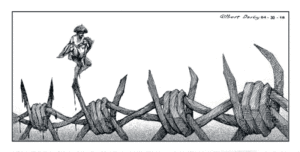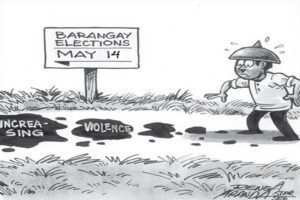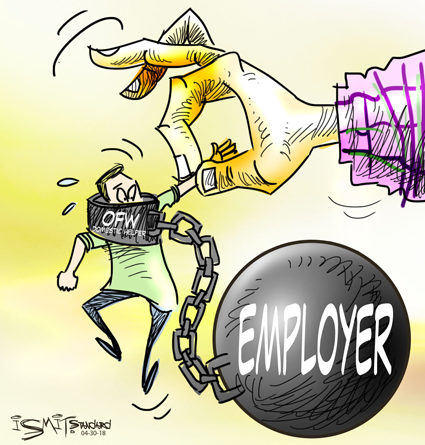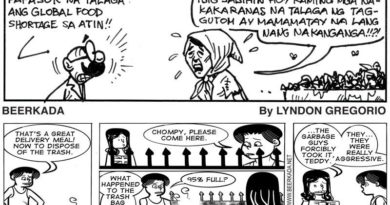OP-ED: EDITORIAL: ‘PH ban on Kuwait-bound OFWs signals migrant labor policy shift’
It did not take long for the Philippine government to respond to Kuwait’s move last week to expel the Filipino ambassador and recall from Manila its own ambassador.
On his return to the Philippines on Sunday morning, after attending the 32nd Asean summit in Singapore, President Rodrigo Duterte announced he has decided to ban permanently the deployment of Filipino workers to Kuwait.
“There will be no more recruitment … especially domestic helpers. Wala na,” Duterte said upon arrival.
That was not all. The President also urged Filipino blue-collar workers already in Kuwait to come home, as he projected that other jobs would become available to them, and that Kuwait could also make things difficult for Filipino workers in the Gulf state.
The situation is very tricky, and the President must have surely made a difficult decision to make the deployment ban permanent. Before the recent homecoming and repatriations, more than a quarter of a million OFWs were working in Kuwait, with over 65 percent of them as domestic helpers.
The obvious areas of concern are the workers’ dislocation and the expected drop in remittances, which have been contributing largely to the country’s robust economic growth.
What is significant about the presidential policy announcement, however, is the recognition of the need to address the broader implications and challenges to Filipino overseas employment, not just in Kuwait, but also in its entirety. The government is taking a longer-term view of the issue.
The President cited among the possible future deployment destinations for OFWs the labor market in China, where some 100,000 English teachers would be needed in the next five years.
There will also be a need for caregivers in countries with aging populations, particularly Japan.
Then there is the rising need for workers by the Philippines’ own national economy. The President said the Philippines itself would need workers because of its fast growing economy, particularly for the government’s “Build, Build, Build” infrastructure program.
Duterte appealed directly to OFWs in Kuwait and their sense of patriotism. He asked them, “Please come home.”
He conceded that things would initially be difficult for returning workers but that matters would “straighten out” eventually.
The President also reiterated that he had no ill will toward the Kuwaiti government, and neither with the Kuwaiti people. He hopes that Filipino workers who choose to remain in Kuwait will be treated humanely by their employer and the Kuwaiti government.
The total ban on workers’ deployment to Kuwait brings to a head the distressing plight of Ms. Joanna Demafelis, the Filipina domestic helper who was found dead in a freezer in February this year, murdered by her employers – which had ignited widespread anger in the Philippines.
The diplomatic ruckus that followed – involving the rescue of Filipino workers claiming to have been abused by their Kuwaiti employers and the Kuwaiti government’s moves seen as retaliatory – all stemmed from the murder of Ms Demafelis. The diplomatic repercussions have not been mitigated by the sentencing in absentia of the employers by a Kuwaiti court.
There was an effort at first to forge a bilateral memorandum of agreement between Kuwait and the Philippines that would assure better working arrangements and conditions for Filipino workers. But this initiative has now fallen through – a victim of the march of events. And events have marched forward even further.
Now, the Philippines is reassessing its entire policy and program for overseas employment for the long term, which should be better for the workers, for the economy, and the dignity of the Filipino nation in the eyes of its own people, as well as the international community. /BY THE MANILA TIMES ON /
.
ASEANEWS EDITORIAL CARTOONS:.
7.1. Many ways to skin a cat – The Daily Tribune

7.2 Macron appeals to US: There’s indeed no Planet B – The Manila Bulletin
.
7.3. Right and wrong – The Manila Standard


7.5. Money matters– The Philippine Daily Inquirer

.

7. Hamon kay Bato ang mga ‘bato’ sa Bilibid – Pilipino Star Ngayon – -SHABURGER!


8.1. Premium-
What Trump got right about the Iran deal – For The Straits Times


Jonathan Eyal
Europe Correspondent For The Straits Times
Jonathan Eyal was born in Romania, but has lived most of his life in Britain. Educated at Oxford and London universities, his initial training was in international law and relations, in which he obtained both his first degree and his Master’s with a Distinction. His doctorate, completed at Oxford in 1987, analysed relations between ethnic minorities in Eastern Europe. After teaching at Oxford for three years, Dr Eyal was appointed a researcher at the Royal United Services Institute for Defence Studies in London. Since 1990, Dr Eyal has been Director of Studies at the Institute. Dr Eyal has authored books on military relations in the Balkans and Eastern Europe, and became a regular commentator for The Guardian newspaper in London. He started writing for The Straits Times in 2001, and is currently the paper’s Europe Correspondent. He is fluent in French, Romanian, Italian, Hungarian and German.
VEERA PRATEEPCHAIKUL FORMER EDITOR
– The Bangkok Post












